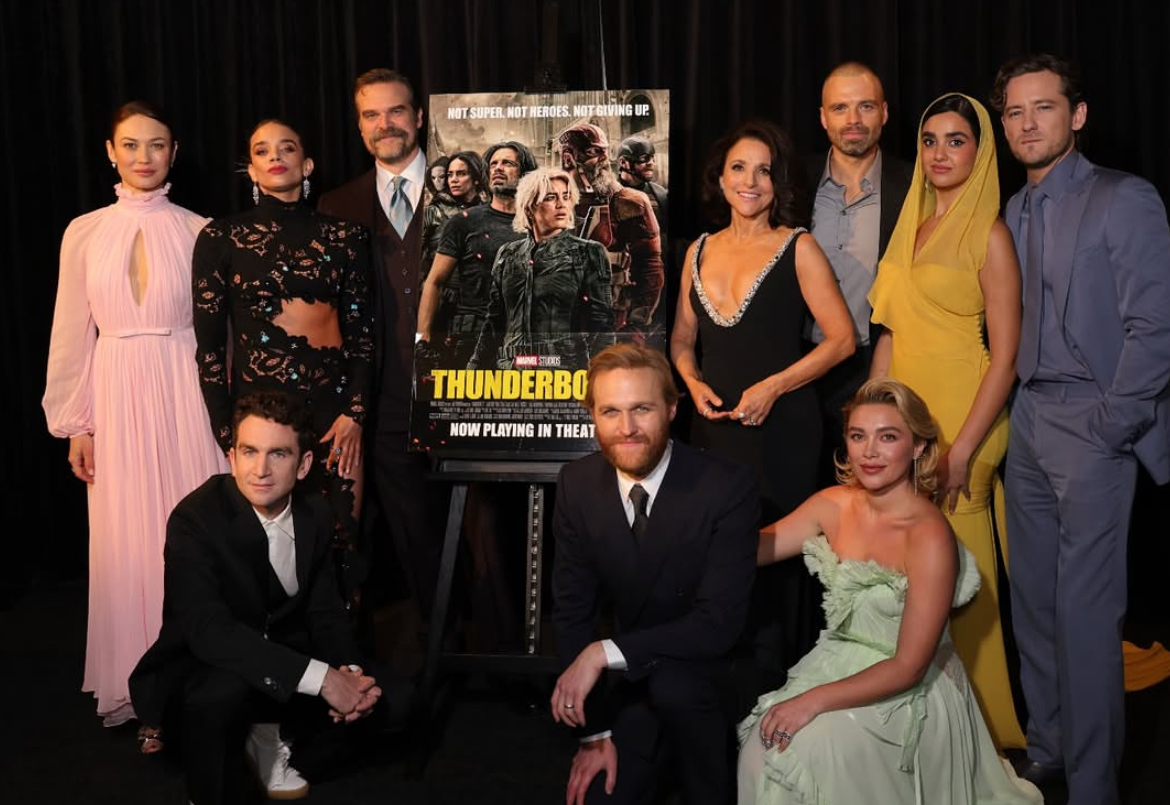With a sunny summer release date of May 2, the Marvel brand and a stellar cast, “Thunderbolts*” weak if not embarrassing box office returns can be classified as anything but heroic. As Marvel gears towards its major blockbuster films in “Avengers: Doomsday” (2026) and “Avengers: Secret Wars,” (2027) the hiccup and reality of the franchise’s future appears rocky and unstable with their new title receiving little attention or monetary gain, regardless of critical appraisal and quality.
Conversely, the factors and reasons for such a subpar return from theaters can be attributed to a cascade of several more alarming factors plaguing not only the Marvel and superhero franchises, but the larger industry of film as a whole. The superhero fatigue ramps up as evident with the releases of “Superman,” “The Fantastic Four: First Steps” and “Captain America: Brave New World,” all grossing $620 million or less; the years of billion dollar and reliable superhero box-offices no longer appear to be viable. Consequently, “Thunderbolts*” had little chance of making a splash, or a “hulk smash” if you will, given the competition of “Lilo and Stitch” at the time as well as an awkward marketing campaign.
Unlike superhero flicks of the past, “Thunderbolts*” relied heavily on background and secondary superheroes. From the talents of Yelena Belova played by Florence Pugh, David Harbour’s role as Alexei Shostakov and Wyatt Russell’s portrayal of U.S. Agent, Sebastian Stan remained the most recognizable and note-worthy actor from the ensemble. Stuck as a sequel for various characters whilst offering an origin story for a complete new team, the film seemingly lacked identity or a clear goal or structure. This made it exceedingly hard to market, as various commercials or advertisements felt repetitive, stale or unoriginal. Regardless of such advertisements, the film itself offers a superb and grounded superhero story which differs from anything that has come before. It has some extremely emotional beats, alongside depth and nuance in its character and themes. However, after talking with fellow classmates and peers, only a fifth of them watched the movie and nearly half held no knowledge or understanding of its existence. Of those who had watched the film, it received only positive feedback and appreciation. It truly saddens me that on my last commercial flight, I saw the film under the free movie section as it slowly fades away from public consciousness engulfed alongside lower-mediocre films.
Among 2025’s other family and property titles with “A Minecraft Movie,” “Jurassic Park Rebirth” and “How to Train Your Dragon” representing pinnacles of financial moviemaking, the stagnation and inconsistent return in superhero films may appear baffling. However, the current situation superhero films find themselves in has been years in the making. Through the inconsistent and rough releases of “Eternals,” “Doctor Strange in the Multiverse of Madness,” “Thor: Love and Thunder,” “Ant-Man and the Wasp: Quantumania” and “The Marvels,” Marvel’s recent trend in pumping out films constantly alongside their Disney+ releases has led to feelings of weariness and overstimulus in the genre. Combined with common releases across Prime Video in “The Boys” and “Invincible” alongside Sony and DC’s ongoing attempts to revitalize their respective superhero franchises, the entire landscape and environment of these films has become repetitive, unoriginal and outright tedious. All these factors and ongoing projects has created what people refer to as superhero fatigue, a belief and sentiment that the genre needs to take a step back and necessary break in order to revitalize the Marvel and superhero brand similar to how the time between the Star Wars prequel trilogy and the sequel trilogy generated global appeal and hype leading to blockbuster hits regardless of their respective film quality or reception.
In retrospect, the struggles and challenges the “Thunderbolts*” movie faces were not of their own making, rather the various choices and films made by Marvel combined with Hollywood has retracted and distanced fans from their brands. With a recent history of poor reception and overloaded release schedule, “Thunderbolts*”’ $382 million of worldwide box office revenue is a sign of a downward trend in a stagnated and repetitive industry. However, it is my belief that the superhero genre will continue to proceed and churn out movies as enough audience awareness and demand remains.
With the rise of horror movie success as seen in “The Conjuring: Last Rites” explosive opening week, the stable and trending movie genre has pivoted. The question then becomes: How do industries shift their business practices in order to maximize profits and keep up with current patterns and consumer habits? I believe “Thunderbolts*” marks a change into more grounded, nuanced and differing storytelling in the industry that will lead to a more diverse franchise that can still entertain and bring in audiences. Now to what effect and what profit remains to be seen as the current reality is filled with instability and inconsistency.
Bobby Spencer, GSB ‘29, is a finance major from Baton Rouge, Louisiana.







































































































































































































Resi Jordan • Sep 20, 2025 at 10:41 am
Outstanding!